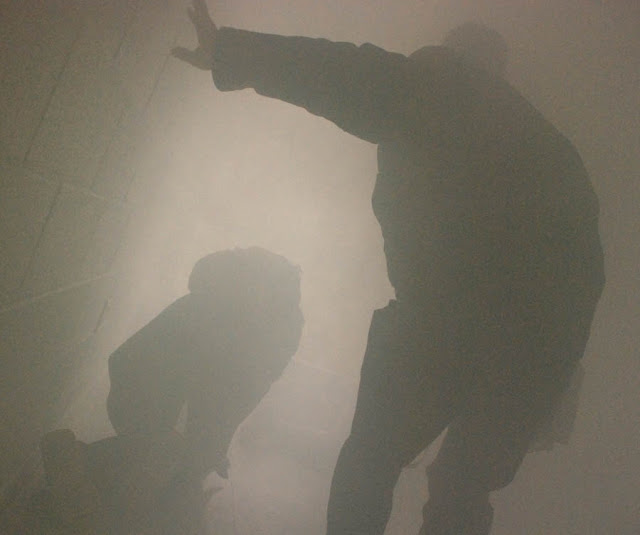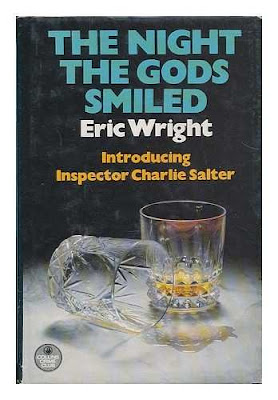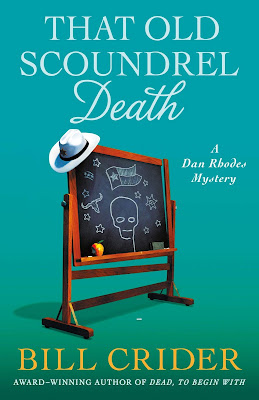It takes me
a lot longer to read a collection of good short stories than it does
a good novel of the same length—even if the chapters are longer
than each of the stories. With chapters I can come back after a
break, and the story's still in my head. I might be surprised by what
happens in the new chapter, but, unless the novel is reaching for
literary cachet, the characters and the voice and narrative thread
are still the same. Not ordinarily so with individual stories.
Despite the ominous aura hovering over the pages of Monkey
Justice,
Patricia Abbott's twenty-three tales of people treading in moral
shadows, each story took me to a different place, with new
characters, different narrators, and no sure expectation of where we
were going.
This can be
a problem for me with fiction, as I tend to identify with the most
prominent characters. Whether I like them or find them repugnant.
Although occasionally in these kinds of stories—known as noir
in the milieu—I find myself caught up in a character who ends
badly, most of them manage to elude the disaster that another
character deserves, and gets. Abbott’s sorcery keeps me in suspense
this way, masterfully misdirecting right up to the surprise twist
that can come anywhere in the narrative. So even though I have a
general notion of what I’m getting into, Abbott pulls the rug out
from under me more times than not. Each story is like a different
Whitman’s Sampler chocolate without the guide. Is the round one the
good one, the caramel? Oops, nope, that’s the cherry
cordial...ptui.
Monkey
Justice
has all of the different shapes, but not a one is a ptui.
Do I have a favorite? This has yet to be determined. The swiftness of
a short-story experience can continue to play out in a reader’s
sensibility long after the reading. The
subtler ones take longer as various
nagging
nuances
refuse
to desist. Stories that give me the most trouble this way usually
feature a character who gives off hints of
being a little too close to the dark side.
I call these characters
“Lucifers,” although the best ones are too ambiguous for me to be
certain. Characters like Flannery O’Connor’s “Misfit,” James
Lee Burke’s “Legion,” or Walker Percy’s “Art Immelmann.” They have enough charm to keep me unsure if they are truly
Mephistophelean.
Are they just plain bad or is there something deeper,
something...well, other? They often have an odd odor and a knack for
insinuating themselves into my trust. They pop up when least expected
and coincidentally most convenient for
them.
I won’t
spoil your surprise by giving you the title of the Monkey
Justice story
from
which
Abbott’s
Lucifer character keeps
popping into my head, making me wonder if it
(no gender hint) is in fact an evil entity or
so
much like real people I’ve known that I shiver at the remembrance.
Another
story that lingers, this one continuing to arouse giddy chortles in my throat, also
features a sinister character. But this one I’ll not only share the
gender but the name, albeit Abbott gives her a fig leaf of anonymity
while ensuring we’d not mistake this former New York Times book
reviewer as anyone other than the woman Norman Mailer publicly dissed
in
a Rolling Stone interview as a “one-woman kamikaze,” and by Susan
Sonntag, who said, “Her criticisms of my books are stupid and
shallow and not to the point.” Abbott tugs the fig leaf back for a
flash of identity when she assigns to her “fictional” reviewer a
quote delivered by the living, breathing Michiko Kakutani in a review
dissing Jonathan Franzen’s memoir The
Discomfort Zone
as “An odious self-portrait of the artist as a young jackass,”
whereupon Franzen shot back with the ultra literary equivalent of yo
mama, calling
Kakutani:
“the stupidest person in New York City.” Oy
veh
(Oibikuru
in Japanese).
In Abbott’s
story the fig-leafed Kakutani is
called Madam X, and it’s told by a
former
gangland bodyguard now fallen to guarding spoiled celebrities. “She
told me stories about getting egged by a guy who wrote books about
bears,” he tells us, and I can feel his sneer. “Another melee
happened with a female writer dressed like a chambermaid. She’d let
herself into Madame X’s room in a Boston hotel, and hidden under
her bed...”
The story
ends with a twist, of course, making me laugh. And I still have no
use for Jonathan Franzen!
These are
only two of the twenty-three. I shan’t mention any of the titles,
for fear of giving something away that might spoil any of the myriad
gotcha
moments
sprinkled throughout Monkey
Justice.
Well, you can have one:
Monkey Justice, which also gives the book its title. In an interview,
Abbott attributes inspiration for the story to an incident on a bus
ride in Detroit. She overheard a fellow passenger telling a story to
someone else:
Who
could resist using a story about a man's wife and mistress giving
birth to his daughters on the same day? The guy on the bus becomes
Gene, the beta male, in my story. I even watched him de-bus at the
[Michigan] Science Center.
He will never know that his story became my story and the title of this collection.
He will never know that his story became my story and the title of this collection.
Abbott is
the author of the Anthony and Macavity-nominated novel Concrete
Angel,
the Edgar and Anthony-nominated Shot
in Detroit
and 2018’ s story collection I
Bring Sorrow and Other Stories of Transgression.
She won a Derringer for her flash fiction story “My Hero.” The
author of nearly 200 stories, she lives in Detroit. You can find her
on pattinase.blogspot.com.













